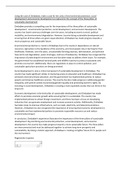Using the case of Zimbabwe, make a case for the unity of environmental protection, social
development and economic development as captured in the concept of the three pillars of
sustainable development
Zimbabwe provides a compelling case for the importance of the three pillars of sustainable
development - environmental protection, social development, and economic development. The
country has faced numerous challenges over the years, including economic turmoil, political
instability, and environmental degradation. However, by prioritizing sustainable development and
ensuring that all three pillars are given equal attention, Zimbabwe has made progress towards a
more prosperous and sustainable future.
Environmental protection is crucial in Zimbabwe due to the country's dependence on natural
resources. Agriculture is the backbone of the economy, and most people rely on farming for their
livelihoods. However, over the years, unsustainable farming practices, deforestation, and pollution
have led to soil degradation, water shortages, and loss of biodiversity. Zimbabwe has recognized the
importance of protecting the environment and has taken steps to address these issues. For example,
the government has established national parks and wildlife reserves to protect ecosystems and
promote eco-tourism. Additionally, there are regulations in place to control pollution, and
sustainable agriculture practices are being promoted.
Social development is also a critical component of sustainable development in Zimbabwe. The
country has made significant strides in improving access to education and healthcare. Zimbabwe has
achieved universal primary education, and the government has implemented policies to reduce
poverty and improve healthcare services. The country has also made progress in addressing gender
inequality, with policies aimed at promoting gender equality and protecting women's rights. By
investing in social development, Zimbabwe is creating a more equitable society that can thrive in the
long term.
Economic development is the third pillar of sustainable development, and Zimbabwe has made
efforts to promote economic growth while ensuring that it is sustainable. The country has
implemented policies to attract foreign investment, and there has been a focus on developing
industries that can generate employment and increase economic activity. Additionally, Zimbabwe
has taken steps to improve infrastructure, such as roads, electricity, and telecommunications.
However, Zimbabwe has also recognized the importance of ensuring that economic development is
sustainable and has implemented policies to promote responsible resource use and reduce
environmental impact.
In conclusion, Zimbabwe's experience illustrates the importance of the three pillars of sustainable
development. By prioritizing environmental protection, social development, and economic
development, the country has made progress towards a more sustainable future. The three pillars
are interconnected and must be addressed together to achieve long-term prosperity and
sustainability. By taking a holistic approach, Zimbabwe is creating a brighter future for its people and
the environment.
Regenerate response




